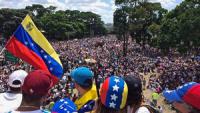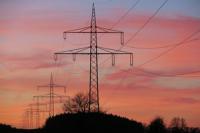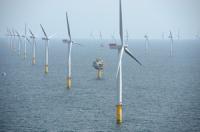-
A how-to guide for climate-proof cities
Traditionally, Maurepas Swamp serves as a natural barrier against flooding that threatens New Orleans each year. Native flora soaks up the rainfall, spreading it across a network of cypress roots and cattail. But centuries of logging and canal construction have drastically altered the swamp’s ecological composition. The Mississippi levee system compounded the issue, isolating the swamp from vital sources of fresh water and nutrients. Flooded with saltwater, much of the existing cypress withered and died. Young trees, now, are few and scattered.
-
-
Melting glaciers causing sea levels to rise at ever faster pace
Melting ice sheets in Greenland and the Antarctic as well as ice melt from glaciers all over the world are causing sea levels to rise. Glaciers alone lost more than 9,000 billion tons of ice since 1961, raising water levels by 27 millimeters.
-
-
Nagging security concerns over using Huawei’s tech in Europe
New report urges NATO members to look to emulate Britain, which created an entire government office to scrutinize Huawei’s products for security problems.
-
-
Bigger than Huawei: U.S. broadens scrutiny of Chinese technology
A flurry of seemingly disconnected actions by the U.S. government to curb the involvement of Chinese technology firms in the U.S. economy over the past year reflects the Trump administration’s intensifying concern that those firms could — now or in the future — abet espionage by Beijing’s intelligence services.
-
-
AI automatically detects disturbances in power supply grids
The grid is changing as the big, centralized providers of the past are replaced by smaller, distributed suppliers. Keeping such complex networks running stable requires high-resolution sensor technology – AI provides a way to make accurate predictions and automatically detect any disturbances or anomalies in real time.
-
-
Saving millions of lives by rapidly shifting to renewable energies
Reducing global air pollution can prevent millions of premature deaths according to an international team of scientists. The most significant contribution would be the rapid phasing out of fossil fuels, which is currently being discussed mainly to abate climate change.
-
-
Venezuela announces major energy rationing amid new power outages

Venezuelan President Nicolas Maduro has announced that the government will reduce the length of the country’s workday and keep schools closed as it attempts to ration electricity in the face of continued power cuts.
-
-
British oversight body: Security flaws in Huawei 5G networks
A British oversight board has slammed the Chinese telecom giant Huawei for software security flaws. The report, however, stopped short of blaming Chinese intelligence agencies for the engineering defects. The United States is concerned that Huawei is a front for the Chinese intelligence services, and that rolling out Huawei’s 5G system in Europe would open the door for Chinese spying or sabotage.
-
-
California hospitals to pay billions for seismic safety upgrades
California hospitals would need to make substantial investments—between $34 billion and $143 billion statewide—to meet 2030 state seismic safety standards, according to a new report.
-
-
Detecting radioactive material remotely
Physicists have developed a powerful new method to detect radioactive material. By using an infrared laser beam to induce a phenomenon known as an electron avalanche breakdown near the material, the new technique is able to detect shielded material from a distance. The method improves upon current technologies that require close proximity to the radioactive material.
-
-
Rapidly melting tall ice-cliffs may trigger faster sea-level rise
Glaciers that drain ice sheets such as Antarctica or Greenland often flow into the ocean, ending in near-vertical cliffs. As the glacier flows into the sea, chunks of the ice break off in calving events. Although much calving occurs when the ocean melts the front of the ice, and ice cliff above falls down, a new study presents another method of calving: slumping. And this process could break off much larger chunks of ice at a quicker rate.
-
-
Modernize the energy grid software

The grid is an intricate, highly complex system. One that has gotten even more complex with the increasing use of renewable energy resources like wind and solar. At some point, something will go wrong. A line will get cut. A generator will fail. There might be a hurricane or a cyberattack. How do you quickly correct for that failure to avoid a cascading blackout?
-
-
Offshore wind energy potential not exploited by U.S. energy companies

When it comes to wind energy, the United States is sitting on a gold mine, so to speak. It’s a moment of untapped potential that, if harnessed properly, could transform the way the U.S. uses energy, one expert says.
-
-
Geothermal plant caused South Korea’ 2017 tremor
A rare earthquake in South Korea was triggered by the country’s first experimental geothermal power plant, government officials said Wednesday. The southeastern port city of Pohang was rattled by a 5.4-magnitude earthquake in November 2017— the second-most powerful tremor ever in the normally seismically stable South.
-
-
Mitigating impact of rising seas, storms along California’s coast
New coastal modeling research presents state, federal, and commercial entities with varying storm and sea level-rise scenarios to assist with planning for future infrastructure and mitigation needs along the California coast.
-
More headlines
The long view
Helping Strengthen America’s Critical Infrastructure
Everyday life depends on a robust infrastructure network that provides access to running water, communications technology and electricity, among other basic necessities. The experts who keep our national infrastructure secure and resilient also need a strong network to share their knowledge and train the next generation of professionals capable of solving complex infrastructure challenges.
AI and the Future of the U.S. Electric Grid
Despite its age, the U.S. electric grid remains one of the great workhorses of modern life. Whether it can maintain that performance over the next few years may determine how well the U.S. competes in an AI-driven world.
Using Liquid Air for Grid-Scale Energy Storage
New research finds liquid air energy storage could be the lowest-cost option for ensuring a continuous power supply on a future grid dominated by carbon-free but intermittent sources of electricity.
Enhanced Geothermal Systems: A Promising Source of Round-the-Clock Energy
With its capacity to provide 24/7 power, many are warming up to the prospect of geothermal energy. Scientists are currently working to advance human-made reservoirs in Earth’s deep subsurface to stimulate the activity that exists within natural geothermal systems.
Experts Discuss Geothermal Potential
Geothermal energy harnesses the heat from within Earth—the term comes from the Greek words geo (earth) and therme (heat). It is an energy source that has the potential to power all our energy needs for billions of years.
